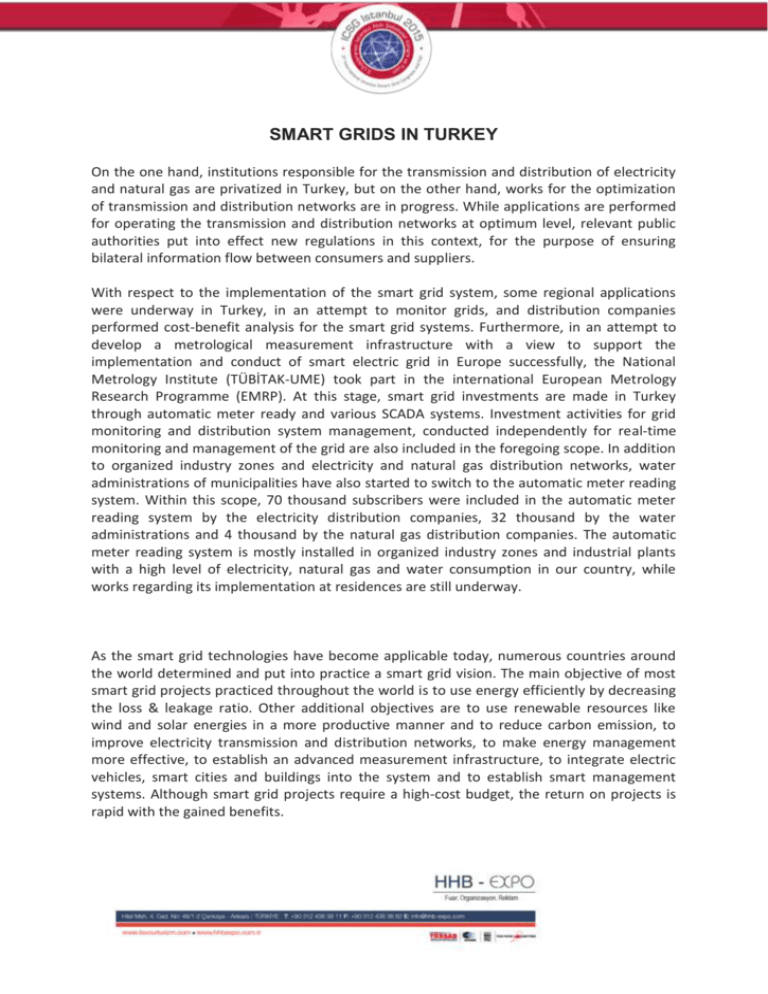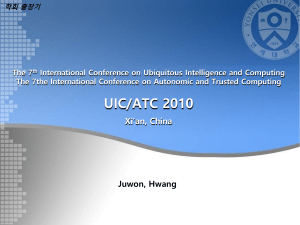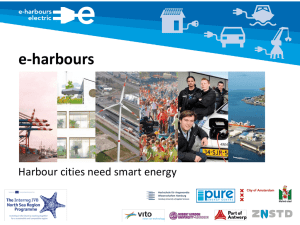smart grids in turkey
advertisement

SMART GRIDS IN TURKEY On the one hand, institutions responsible for the transmission and distribution of electricity and natural gas are privatized in Turkey, but on the other hand, works for the optimization of transmission and distribution networks are in progress. While applications are performed for operating the transmission and distribution networks at optimum level, relevant public authorities put into effect new regulations in this context, for the purpose of ensuring bilateral information flow between consumers and suppliers. With respect to the implementation of the smart grid system, some regional applications were underway in Turkey, in an attempt to monitor grids, and distribution companies performed cost-benefit analysis for the smart grid systems. Furthermore, in an attempt to develop a metrological measurement infrastructure with a view to support the implementation and conduct of smart electric grid in Europe successfully, the National Metrology Institute (TÜBİTAK-UME) took part in the international European Metrology Research Programme (EMRP). At this stage, smart grid investments are made in Turkey through automatic meter ready and various SCADA systems. Investment activities for grid monitoring and distribution system management, conducted independently for real-time monitoring and management of the grid are also included in the foregoing scope. In addition to organized industry zones and electricity and natural gas distribution networks, water administrations of municipalities have also started to switch to the automatic meter reading system. Within this scope, 70 thousand subscribers were included in the automatic meter reading system by the electricity distribution companies, 32 thousand by the water administrations and 4 thousand by the natural gas distribution companies. The automatic meter reading system is mostly installed in organized industry zones and industrial plants with a high level of electricity, natural gas and water consumption in our country, while works regarding its implementation at residences are still underway. As the smart grid technologies have become applicable today, numerous countries around the world determined and put into practice a smart grid vision. The main objective of most smart grid projects practiced throughout the world is to use energy efficiently by decreasing the loss & leakage ratio. Other additional objectives are to use renewable resources like wind and solar energies in a more productive manner and to reduce carbon emission, to improve electricity transmission and distribution networks, to make energy management more effective, to establish an advanced measurement infrastructure, to integrate electric vehicles, smart cities and buildings into the system and to establish smart management systems. Although smart grid projects require a high-cost budget, the return on projects is rapid with the gained benefits. It is believed that a country with great objectives, like Turkey, should be among the countries governing change, not a country exposed to the effects of the technological change. The same country is planned to be one that not only uses smart grid systems, but also develops, projects and produces such systems. Within this framework, Turkey is intended to guide the transition process of other countries in its region to the smart grid systems and also to encourage domestic and foreign companies to make investments in our country in this respect. In the medium and long term, all existing meters are aimed to be replaced with smart meters pursuant to the 2023 strategic vision. Since smart grid systems are based on quality and real-time data collection, ensuring security of the same data is a significant component of the system. The results expected to be obtained from smart grids depend on ensuring an effective and safe data communication between the parties who will contribute to these grids. A secure data communication system is as important as an extensible and applicable data communication network. In case of any security gap in the grid, threats like blocking of communication and control systems and altering and sending production and consumption data may arise. On the other hand, it may also lead to security gaps arising from monitoring via smart meters the data related to consumption in a residence or commercial facility and to the activities carried out in the same fields or habits of the residents, as well as threats against personal privacy and confidentiality of corporate information. In order to avoid such security gaps, first no unnecessary data should be collected and the levels of access to the data gathered at system centre should be determined. The smarter grids get, the more they become open to cyberattacks. The measures to be adopted against cyber-attacks and smart grids need to be evaluated together through cyber security works. Security works launched against cyberattacks within TÜBİTAK’s Cyber Security Institution can also be utilized in this context. In Turkey, lack of common minimum criteria for meters and communication equipment, one of the most significant components of smart grid system, as well as absence of criteria for the security of data within the smart grid and undetermined standards for a compatible operation of the entire system pose an obstacle against smart grid practices. The greatest contribution of smart grids to energy efficiency is that it reduces the loss & leakage ratio occurring on electricity transmission and distribution lines. A large part of the energy generated in Turkey is lost on the transmission and distribution line. Smart grids not only turn the energy generation, transmission and distribution line into a more productive, reliable, flexible and compatible one, but they also reduce the errors arising from misreading meters and take measures by automatically detecting lines suffering from loss of energy. Furthermore, whichever line is subject to illegal use can also be immediately detected at the center. Thanks to its functions, smart grids ensure that energy is generated as much as needed and prevent redundant energy generation. As consumers can instantly follow their daily energy usage, they can change their usage habits and tend towards energy saving. Additionally, the electrical appliances, lighting, smart buildings and electric vehicles to be used at smart grids will reduce energy consumption and increase energy efficiency. Issues such as the advantages and disadvantages of smart grids, model smart grid projects around the world, smart meters and role of smart grids in energy efficiency will be open to public discussion during the 3rd International Istanbul Smart Grid Congress and Fair, which is to be held between April 29 and 30, 2015, and supported by both the Ministry of Energy and the Ministry of Science, Industry and Technology. Thousands, local and foreign, are expected to attend the congress. www.icsgistanbul.com






